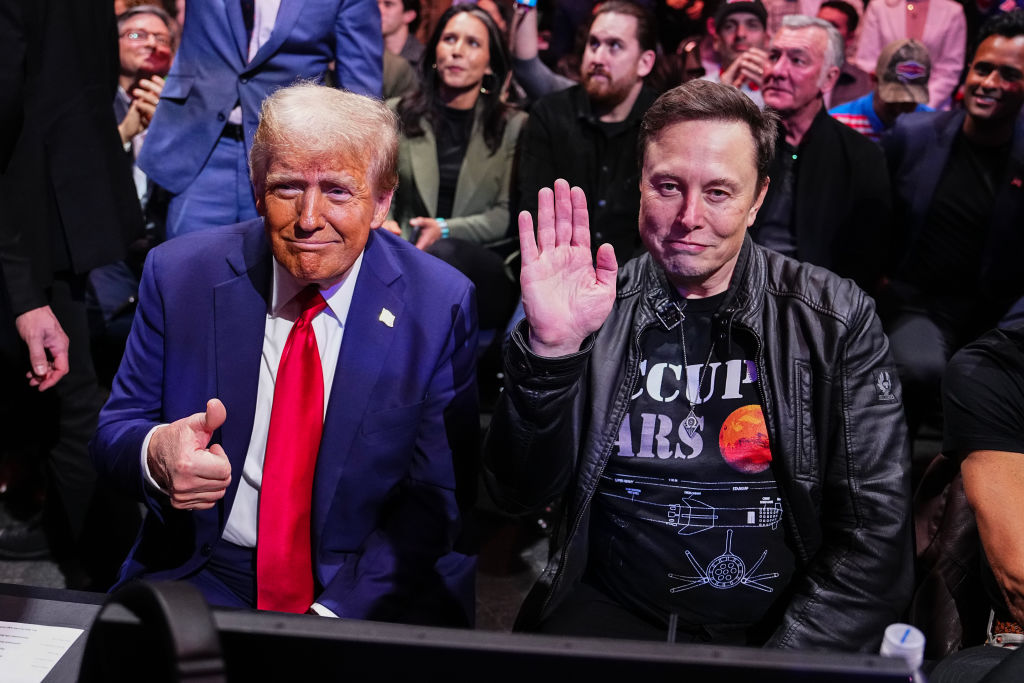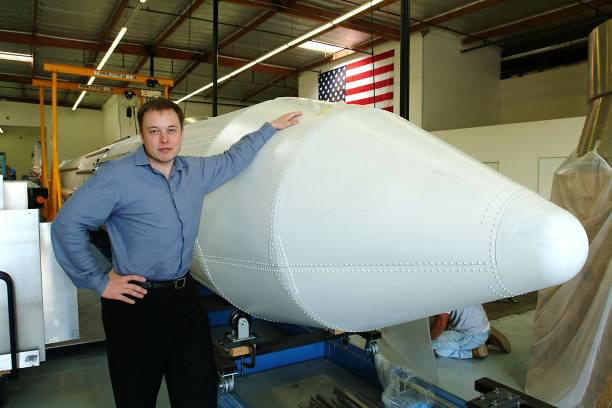Even Baby Elon yearned to be a god. Paul Harris/Getty Images

In 414 BC, Aristophanes’ The Birds was first performed in Athens. In this comedy, two disgruntled middle-aged men, fed up with life on Earth, convince a giant bird to create a great city in the sky. Free from the cruel tyranny of the Olympian gods, mankind could achieve true fulfilment in this avian paradise. Out of this came the expression “cloudcuckoo land”, used to describe an idea completely divorced from reality. It reminds me of two other disgruntled middle-aged men — Jeff Bezos and Elon Musk — and their fantasies of celestial utopia.
I’m a space sceptic — rockets don’t move me. Back in 2006, I explored the seedier side of America’s lunar mission in my book, Dark Side of the Moon. It sparked outrage among those space enthusiasts who still cling desperately to Nasa’s glorious myths. And so I concluded that the world is roughly divided into two groups: there are those who care passionately about space and those who don’t give a fig. Men are prominent in the first group, women in the second. Go figure.
Being a space sceptic is a niche profession. This means that my phone rings whenever something important happens in space. Thanks to Musk, it’s been ringing a lot lately. And with the sixth launch of his Starship rocket yesterday, it’ll continue to do so. I care about space — in the sense that I believe that the dangerous fantasies of space moguls need to be exposed. And I still adore the old astronauts like John Glenn, Yuri Gagarin and Neil Armstrong, all enormously brave men. But I recognise that they were mere pawns in a pointless political battle.
The recent exploits of Musk and Bezos fit into a longer story about celestial utopia. In 1869, Edward Hale published The Brick Moon, a short novel about a massive brick spaceship that is conceived as a navigational aid for those on earth. But a harmonious community, distinct from anything earthbound, quickly evolves within. Gravity was a cruel tyrant that prevented man from achieving true spiritual enlightenment.
President Ulysses Grant called the Brick Moon “the biggest thing since Creation, save for the invention of Bourbon whiskey and the Havana Cigar”. He was probably joking. Exactly 100 years later, President Richard Nixon described the Apollo 11 mission as “the greatest week in the history of the world since the Creation”. He wasn’t joking. Mature, otherwise intelligent men genuinely believed that Armstrong’s small step was a “giant leap for mankind”. Armstrong himself expressed surprise that the lunar landing didn’t immediately bring the Vietnam War to an end.
According to this gospel of space, if man escaped Earth’s surly clutch, his soul would likewise soar. Earth was, some said, a “lousy planet”, a drag on human fulfilment. The idea was eventually taken up by physicist Gerard O’Neill who in 1981 predicted that a giant community orbiting in space would usher in an age of “perpetual plenty”, eradicating war, famine and poverty. Nasa paid him a large amount of money just to dream of utopia.

This brings us back to Bezos and Musk. Wearing a t-shirt with the slogan “Occupy Mars”, Musk is a man who has everything but now wants a planet. It’s not yet clear what deal he has made with Donald Trump in exchange for support during the election — yet my guess is that it involves rockets.
Musk first set out his vision in an article in New Space in 2017. Rather than a serious discussion of interplanetary migration as Musk intended, it reads like a comic book. If you’re seeking profundity, look away now. “It would be quite fun to be on Mars,” he writes, “because you would have gravity that is about 37% of that of Earth, so you would be able to lift heavy things and bound around.” He admits that Mars “is a little cold”, (it has a median temperature of -65°C), “but we can warm it up”. And don’t worry about those windstorms that can last for months and which have the abrasive effect of shaving with a power sander. He’s going to fix all that. Musk aspires to be both a 19th-century imperialist and a god. “On the fifth day, Elon created an atmosphere. And it was good.”
Bezos thinks Musk is crazy — for the Amazon founder, turning Mars into a liveable planet is pie in the sky. He prefers instead an expanded version of O’Neill’s vision, with thousands of people living in an “Orbital Reef”. This would eventually expand into a vast conglomeration of connected tubes where trillions of people would live, creating the statistical probability of “1,000 Mozarts and 1,000 Einsteins”. When it comes to dreaming, these guys don’t mess around.
All this might seem exciting to space nuts, but life would have all the romance of a transcontinental flight, except with no destination and no ETA. Reality would be much more mundane than the paradise promised by Musk and Bezos. Residents would breathe recycled air, drink recycled urine and live in perpetual fear of a catastrophic decompression caused by a collision with space debris. Featureless aluminium walls would drip with condensation and the air would smell of Dettol.
Bezos has gone a bit quiet of late, or rather Musk’s exploits with SpaceX have hogged the limelight. And with the latter’s proximity to Trump, we should probably concentrate on what he has in mind. He’s promised to resettle a million people on Mars by 2050, with the first settlers arriving by 2030. Since Mars and Earth are in close synchronisation only once every 26 months, that means that there are only 10 windows of opportunity between 2030 and 2050. He claims that his Starship reusable rocket will be able to transport 100 people or 100 tons of cargo at a time. That suggests 10,000 flights in 10 months, just for the human passengers. Added to that would be an equal number of cargo flights necessary to construct a city on Mars. So, we’re talking roughly 20,000 flights over about 300 days.
In addition to miners and rocket scientists there would be doctors, lawyers, accountants, sewage workers and pizza chefs. There would also be criminals, since that’s statistically inevitable. Musk figures that a ticket to Mars would initially cost around $500,000, decreasing to $100,000 over time. This could be paid for with a loan underwritten by SpaceX and paid back by working on the Red Planet. In other words, Musk wants something similar to the 19th-century American company town. His version of utopia consists of a million people in a state of perpetual indentured servitude, paying him for the houses they live in, the air they breathe and the water they drink. I’m reminded of the song “Sixteen Tons” by Tennessee Ernie Ford:
You load 16 tons, what do you get?
Another day older and deeper in debt
St. Peter, don’t you call me ’cause I can’t go
I owe my soul to the company store.
One wonders what type of person would want to sacrifice Earth’s rich bounty for a life on desolate Mars. The idea would probably attract people either hopelessly deluded or bitterly unhappy. Neither seems like the raw material of a stable community.
At first, these Martian residents would only be able to venture outside their enclosed shelters in spacesuits. Musk plans to fix that, however, by “terraforming” Mars, that is, turning it into an Earth-like environment. By using nuclear explosions, he’ll release the carbon dioxide frozen in the polar regions and, hey presto, there’ll be a weather system, breathable air, oceans, lakes, flora and fauna. Technically, the task might be feasible, but solving climate change on Earth would be a doddle compared to terraforming Mars.
The big question, it seems, is: what’s the point? Why build a colony on Mars if Earth’s environmental problems could be fixed for a fraction of the cost? Musk claims that humans need to become interplanetary in order to survive as a species. “I think this is an incredibly important thing for the future of life itself… there’s always some chance that something could go wrong on Earth. Dinosaurs are not around anymore!” That’s certainly true, but I’m sure there are deeper, more personal motives. One senses that Musk shares that mistaken belief that gravity is a tyrant, that a different world will produce a different human.
That vision seemed preposterous, but rather harmless, when described by Hale. Expressed by Bezos and Musk it seems downright frightening. We know them; we’re familiar with their rapacious labour practices. Tesla and Amazon are not good blueprints for utopia. What these billionaires seem to have in mind is an idiosyncratic paradise free from the laws that constrain them on Earth. They want King Leopold’s Congo, but in space.
When I was a boy, astronauts were my heroes. Their exploits carried me through a difficult decade of riots and war. My dad contributed to the space adventure by making components for the Saturn rocket that took Armstrong to the moon. But then he died an early death, killed by the carcinogenic chemicals he’d once handled. After I became a historian I discovered just how cynical the space race was, how good people were exploited to win a Cold War pissing contest.
Space travel has always been an ego trip; but at least back then there were real heroes who made it fun. Nowadays billionaires, not nations, are at the helm. The once heavenly realm has become an arena of greed and power. The lustre is lost. Musk’s version of utopia is not just cloud cuckoo land. It’s also a nightmare.









Join the discussion
Join like minded readers that support our journalism by becoming a paid subscriber
To join the discussion in the comments, become a paid subscriber.
Join like minded readers that support our journalism, read unlimited articles and enjoy other subscriber-only benefits.
Subscribe